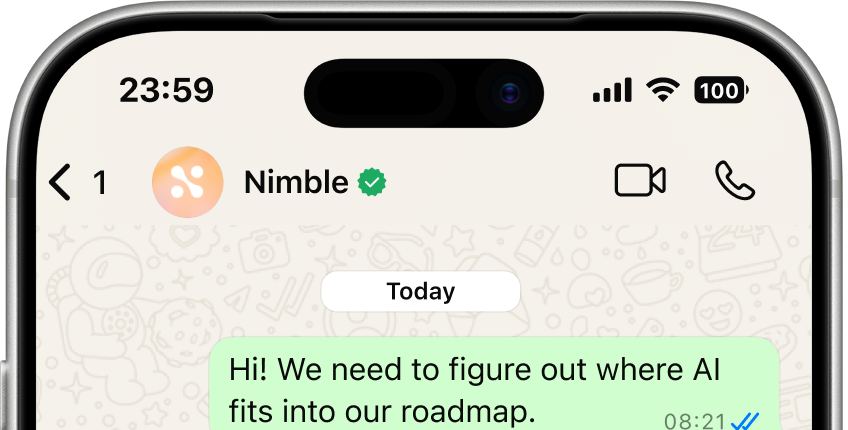The status quo
Recent healthcare innovations and digital solutions are slowly bridging the gap between patient expectations and healthcare offerings. Things like remote consultations, medication reminders, planning tools, asynchronous and personalized care pathways… They all contribute to one and the same goal:
Engaging and supporting patients at every single touch point across their journey, using technology people have already adopted. It's about making healthcare more accessible, personalized, and holistic.
Because many people feel left to their own devices the moment they leave the hospital or doctor's office. Because they know their next visit is weeks or even months away, and their HCP will be in a rush at all times when you try to call them. Bringing healthcare to the patient instead of the other way around, that's what the digital front door enables.
The digital front door matters
That said, a digital front door is not a product per se, but more of an omnichannel engagement strategy, if that makes sense. It doesn't delineate what it should look like, but rather what it should accomplish: Providing care and support wherever the patient may be, at whatever stage of their journey. One thing this strategy recognizes is this: People love convenience.
Think about it, who wouldn't love to get a professional to take look at their case without having to drive anywhere, sit around in waiting rooms, make multiple phone calls, or wait for 3 months for your their appointment? Unfortunately this is still the status quo for many healthcare institutions, but change is on the horizon.
On the side of healthcare providers, the digital front door can address a plethora of issues as well:
- Understaffing, burnouts, stress
- Siloed-off data, lack of transparency
- Patient safety and monitoring, EMR/EHR integrations
Awell and Bothrs joining forces
To be clear, there is no singular solution or technology that enables you to build a digital front door. Among other things, you need clinical expertise, regulatory and legal proficiency, and you need to know how to build digital products that actually work. This is where our partnership with Awell comes in.
As we've learned over the years, when it comes to building digital products, you should stick to your strengths. Bothrs doesn't have the expertise to build incredibly niche tools or clinical workflows like Awell can, but we do excel at building patient experiences and provide the platform Awell needs to flourish.
Together, we can elevate each other's work. Awell always operates as a back-end workflow orchestration tool, but their clients also need a nice front-end experience for both patients and providers to go with it. This is, in turn, where Healthblocks shines. Let us clarify:
What is Awell?
Awell is a low-code platform used by clinical and product teams to design clinical workflows and integrate them into their tech stack. With Awell, care organizations automate routine clinical tasks, synchronize data between systems and drive seamless coordination between care teams and patients. As it stands, Awell can be integrated with Bothrs’ Healthblocks platform on a dime.
What is Healthblocks?
Healthblocks is a subscription-based, modular platform for building digital patient experiences, built by Bothrs. In simple terms, you can think of it as a LEGO set. Simply connect a bunch of pieces you like to build the patient experience you're after. Each little block has been carefully user-validated, and made ISO-compliant and GDPR-proof. And by partnering with Awell, we can create a lot more use cases for the Healthblocks platform as a whole.
What is Bothrs?
All this technical babble aside, the fact of the matter is you also need a service partner to put teams to work, define goals and roadmaps, and start building that front door to care. Each client project gets assigned a dedicated product team, who work towards a first viable product release as quickly as possible. This holy trinity, consisting of Awell, Healthblocks, and Bothrs, is already in full swing. Together, we're currently building a virtual hospital for AZ Maria Middelares.






